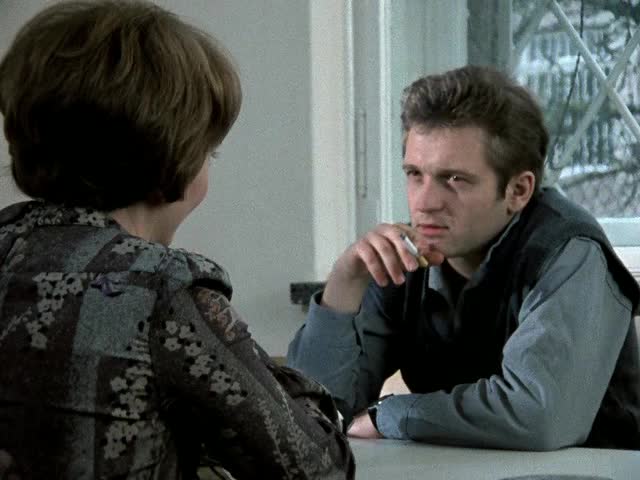RW Fassbinder's I ONLY WANT YOU TO LOVE ME
The power behind the (originally) TV movie I Only Want You to Love Me isn't (or not necessarily) that because it's based on an actual murderer interview that Rainer Werner Fassbinder read it makes for a compelling movie. Who knows, this could've been boring as hell (and for some who might come to it, whether it's before or after seeing other Fassbinder films, they might feel this way), as any film has to present itself as being fully DRAMATIC, and Fassbinder's gift was kind of going for that but at the same time adding a peculiar distance - not all the time, but sometimes - in how the drama is presented.
But the power behind this, to get back to my first point, is that it feels so wholly personal for this filmmaker: I had the notion watching this, both feelings and thoughts varying between the two depending on the scene, that perhaps Fassbinder looked at this man Peter Trapper and said, "you know, I could've been this guy, in another life." The empathy is wholly palpable, and in a way it's like an (unintentional?) remake of Why Does Herr R Run Amok?, only better and more focused and experimental in small ways.
 |
| #Patriarchy |
Although, come to think of it, that may not be fair; it's probably as foolish of me to try and play arm-chair psychologist regarding Peter and his childhood, regardless of the only flashback we get to when Peter's mother beat his butt senseless with a stick (the flash cut from this to adult Peter smashing someone with a telephone, we don't know who or why yet, and then to him talking to someone in a room about his past... it's one of those moments where you go, "now THAT is daring filmmaking!"), as it would be for Peter to buy his wife a coat or sewing machine without asking or talking to her first. The one thing that I do think is there to witness, and this is looking beyond the lines (though not by much), is that Peter is fully shaped by the upbringing he had and the world he's in, whether he'd acknowledge it or not, and it goes to how he treats Erika as far as "Don't 'but' me, I'm doing this for you," and the general sense of, as nice as he is, everything is about what HE thinks he has to, MUST do, for her (this extends to the workplace as well).
Does this mean it doesn't date well? I don't think that's the case: on a personal level I related to this as I've been a working class person for much of my adult life (not a brick-layer, but that economic bracket, living paycheck to paycheck), and as far as creating that realism, Fassbinder knocks it so far out of the park there's no more parks to look down upon. I can believe there are men who think and act this way because it's all they know, this is the world they have to work in and, as much of the Western world is, THINGS matter so much as does money and how much there is and, going back to Peter's stiff and probably terrible parents, how Peter's been taught to view money. Is he going to do better than them? Does he want to BE them, to have that kind of wealth - he can go to his father for money but, often, the shame is excruciating more-so than the long hours he over-works himself for - and what does that say about him, decency aside?
There's so much rich stuff here that it's worth mentioning the actor Vitus Zeplichal, who's Peter. I didn't remember seeing him before (he had worked with RW before and after this, albeit in supporting roles), but I'll never forget him after this. I'd love to find out whether it was Fassbinder or Zeplichal's idea for Peter to rarely, if ever, blink. It's a clear decision as it's not something you can tell from the other actors, and it stands out as well due to how big his eyes are, how much we can read in to it.
 |
| Intercut interviews |
Something I pondered too at the end of this is... was Peter's fate, well, fate? Did he have a choice to change, or would he be doomed like other Fassbinder characters in these melodramas? I'm not sure if this is "better" than, say, Ali Fear Eats the Soul or Petra von Kant, but this carries such a degree of realism that I'd have to think the Charlie Kaufman from Adaptation would have a poster of this on his wall, and yet it has a level of stylization that marks it as being a cinematic experience, not just like docudrama or other.
(Or, to go back to 'documentary style, the in-name-only Fassbinder collaboration, Herr R, which was shot hand-held but was much looser than this film, which feels tight for all of its experimentation and propels the tragedy forward much greater than that work).




Comments
Post a Comment